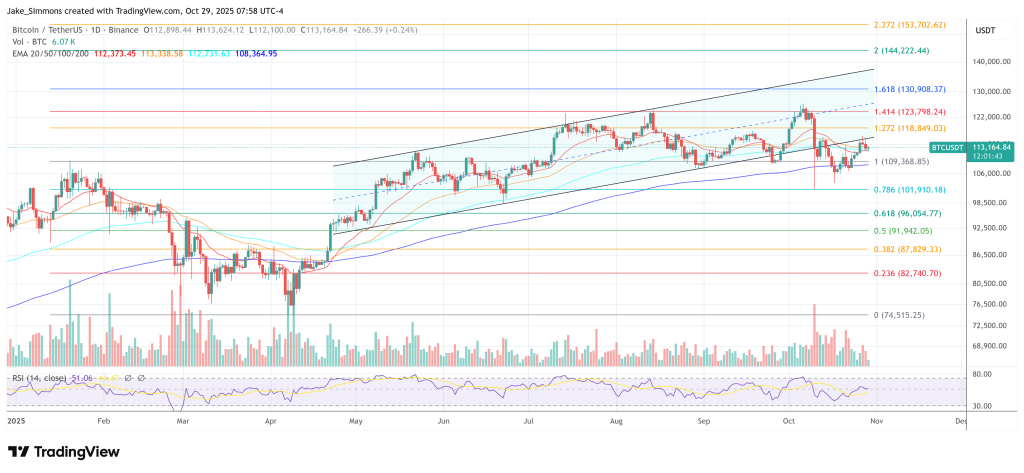Germany’s Poll-Leading Party Goes Full Pro-Bitcoin
Germany’s largest opposition force, Alternative für Deutschland (AfD), has submitted a Bundestag motion positioning Bitcoin as a strategic technology and urging Berlin to protect the protocol—and its users—from what the party calls excessive government and EU control. The motion, under the title “Recognizing the Strategic Potential of Bitcoin – Preserving Freedom through Restraint in Taxation and Regulation,” is signed by the AfD parliamentary leadership and spearheaded by MP Dirk Brandes.
In the text, the party explicitly separates Bitcoin from the broader “crypto-asset” category defined under the EU’s Markets in Crypto-Assets (MiCA) framework. It states that “Bitcoin is a decentralized, non-manipulable, and limited-supply digital asset, and fundamentally differs by its technical design from other so-called crypto-assets.” The motion warns that applying MiCA’s regulatory logic to “an open, decentralized protocol such as Bitcoin” would endanger innovation and digital sovereignty, calling excessive regulation a threat to “financial freedom.”
Germany’s AfD Makes Its Pro-Bitcoin Stand
On the regulatory front, the AfD asks the federal government not to impose licensing or registration requirements for non-custodial Bitcoin activity—explicitly naming self-hosted wallets, Lightning nodes, and infrastructure tools—so long as no customer funds are held in custody.
Tax policy is a second focal point: the motion demands clear legal protection for Germany’s existing one-year holding period after which private gains are tax-free, and calls for a statutory distinction between Bitcoin and other crypto-assets. It further insists that BTC mining and Lightning operation for private purposes should not be classified as commercial activity.
Beyond the regulatory and tax proposals, the AfD calls for a formal government strategy paper on Bitcoin’s role as “free, digital money,” exploring its technological, energy, and monetary implications.
The AfD’s communications office paired the filing with a pointed attack on the European Central Bank’s “digital euro” project, framing BTC as a civil-liberties alternative. In a party release dated October 23, 2025, Dirk Brandes declared: “Freedom begins with money… The digital euro is nothing more than a tool for surveillance and control – the opposite of freedom. Bitcoin, on the other hand, stands for independence, property, and self-determination.”
The statement further urges the government “to recognize Bitcoin as a strategic future technology, to build state Bitcoin reserves, to enable pilot projects for BTC payments in the public sector, and to end the tax discrimination of crypto-assets.” Brandes concluded that “Germany must finally become an innovation leader in this area – not a surveillance state.”
However, the text of the official Bundestag motion itself is more restrained. It does not explicitly mandate the immediate accumulation of sovereign Bitcoin reserves or the launch of public-sector Bitcoin payments. Rather, it argues in principle that Bitcoin should be viewed as “outside money”—a neutral global base layer of value—and that it could be “conceivable” within state reserve management in an era of monetary and geopolitical uncertainty. The motion’s operative demands focus instead on regulatory restraint, tax clarity, and a comprehensive federal strategy.
In its parliamentary briefing, the AfD summarized the goal concisely: to free BTC from unnecessary regulatory and tax burdens and to prevent the application of MiCA to a decentralized base protocol.
The political backdrop adds weight to the move. Since spring 2025, multiple national polls have shown AfD leading Germany’s political field, edging out both major establishment parties. An April Ipsos survey placed AfD at 25%, ahead of the CDU/CSU at 24% and the SPD at 15%.
These are polling figures, not electoral results, but they underscore why AfD has intensified its libertarian, pro-sovereignty messaging—using BTC as both a symbol of resistance to state control and a tangible policy wedge against the establishment parties.
Institutionally, the motion faces steep odds. The AfD remains in opposition to the governing grand coalition of CDU/CSU and SPD, led by Chancellor Friedrich Merz, which was confirmed by the Bundestag on May 6, 2025. Without committee majorities or procedural control, AfD’s proposal is unlikely to advance to a vote in its current form. Still, several of its core elements—particularly legal certainty for the one-year tax exemption—may find cross-party resonance as part of upcoming MiCA transposition debates.
At press time, Bitcoin traded at $113,164.

You May Also Like
Fed rate cuts loom! Make passive income with CryptoMiningFirm Cloud Mining

21Shares files HYPE ETF, Bitwise Solana ETF sees ‘huge number’ on day 2
21Shares has filed for a Hyperliquid ETF, while Bitwise’s Solana staking ETF has a big day of trading as investors perk their ears toward altcoins. Asset manager 21Shares is seeking to launch an exchange-traded fund (ETF) tracking the token behind the perpetual futures protocol and blockchain, Hyperliquid, amid growing Wall Street interest in alternative cryptocurrencies.The company filed for the 21Shares Hyperliquid ETF with the Securities and Exchange Commission on Wednesday, which did not disclose a ticker symbol or fee. Coinbase Custody and BitGo Trust were named as custodians.It follows a similar filing for a Hyperliquid (HYPE) ETF from Bitwise last month. The token gives discounts on the Hyperliquid decentralized exchange and is used to pay fees on its blockchain. It has increased in value over the past year, in line with the service’s growing popularity.Read more
